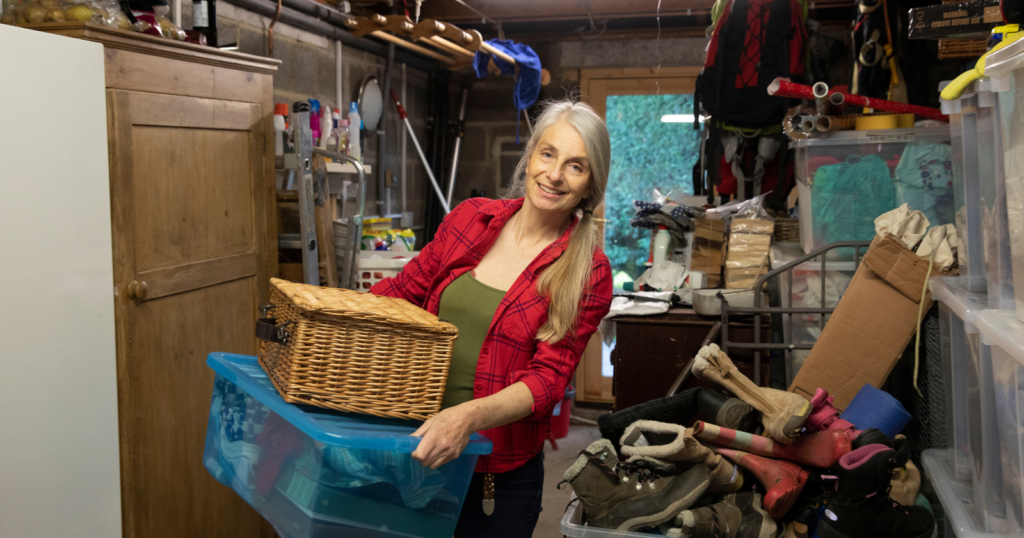Have you ever held an object and thought, “I should probably toss this… but what if I need it later?” If so, you’re definitely not alone. Many of us have that junk drawer (or entire garage) full of “someday” items.
As a relationship counselor turned self-development coach, I’ve seen this pattern in clients and, honestly, in myself. We keep old cables, worn-out clothes, and stacks of random stuff just in case. Why is it so hard to let go?
Well, it often comes down to personality traits and mindsets. In fact, there a few common traits among people who struggle to declutter because of that “might need it later” reasoning.
Today, we explore five of them, with a warm, honest look at why our brains cling to clutter (and perhaps a gentle nudge toward freedom).
1. Perfectionism
Do you hesitate to get rid of things unless you’re 100% sure it’s the right decision? That could be perfectionism whispering in your ear.
Perfectionists feel an intense pressure to avoid mistakes – including the “mistake” of throwing out something useful. You might keep three old phone chargers just in case one works, or hold onto a torn sweater because you plan to mend it perfectly someday. The irony is, in striving not to err, we end up with piles of indecision on our floors.
Research back this up. In one study of people with hoarding tendencies, researchers noted that perfectionism was linked to difficulty letting go. Basically, saving things becomes a way to avoid the decision of throwing anything away, along with the worry that a decision might be a mistake
Do you recognize this in yourself? Maybe you won’t donate those barely-used art supplies because, “What if I need them when inspiration strikes?”
If so, try to remember that perfectionism only weighs you down. Embracing a bit of imperfection — trusting that it’s okay to let go of an item even if you might have found a use for it — can be liberating.
2. Anxiety and fear of uncertainty
For many people, clutter is less about the stuff and more about soothing anxiety. Hanging onto things “just in case” can create a psychological safety net.
If you struggle with general anxiety, you might feel a lot of “what if?” scenarios running through your head. What if I get rid of this and then I desperately need it? What if disaster strikes and I’m not prepared?
Keeping the item is a way to quiet that worry – at least temporarily.
In psychology, there’s a concept called intolerance of uncertainty, which basically means we feel extremely uneasy not knowing what the future holds. If you have this trait, an old camping lantern with a flickering bulb isn’t junk; it’s backup emergency lighting for a hypothetical power outage. That box of random cables gives you comfort that you could handle any surprise tech issue.
The underlying emotion is fear – fear of being unprepared, of needing something and not having it, or of making a decision you can’t undo.
Get Smarter Everyday Join Us On WhatsApp
If this trait hits home for you, know that you’re not alone and that there are healthier ways to find safety. Try reminding yourself that you’ve likely managed before without that item and that often, our worst fears never materialize. Instead of imagining a dozen emergencies where you need each object, imagine the freedom of a uncluttered space and trust yourself to handle things as they come.
3. A scarcity mindset
Do you find it nearly impossible to throw something away because it feels wasteful or you’re convinced you won’t be able to get it again later?
This points to a scarcity mindset, a deep-seated belief that resources are limited and you must hold onto what you have. People with a scarcity mindset live by “what if I never have this opportunity or item again?” It’s the classic “waste not, want not” mentality – taken to an extreme.
From the moment we wake up, we’re thinking about what we don’t have (enough sleep, enough time, enough stuff). If you carry that never-enough feeling, it’s no surprise you struggle to part with belongings. Throwing something out feels akin to throwing away potential – the potential to use it, to save money, to have enough in the future.
Sometimes this trait comes from life experiences. If you grew up with hardship or witnessed your parents scraping by, hanging onto everything “just in case” can become second nature.
Indeed experts have noted that some people’s hoarding tendencies link back to childhood experiences of poverty or loss – essentially, early messages that you might not have enough or that things won’t be there when you need them. Interestingly, research has also found that many chronic clutter-bearers will even acquire extra items for later use.
The downside is that this mindset can trap you in a cycle of never feeling secure, no matter how much you keep. There’s always a nagging fear of future need.
To break free, it can help to consciously shift towards an abundance mindset. Remind yourself that we live (for the most part) in a time of plenty. Chances are, if you truly need something down the road, you’ll be able to borrow, buy, or improvise.
4. Emotional attachment
Sometimes, the reason we keep stuff isn’t about future utility at all – it’s about the past and the feelings we’ve attached to those objects.
If you have trouble letting go of clutter because “this means so much to me,” or “it just feels wrong to get rid of it,” you might have a strong sentimental streak. People who are highly sentimental or nostalgic often hang onto items with the idea that they’ll want them later as a way to remember or feel connected – even if the items have no practical use.
I’ll admit, this one hits home for me.The truth is, I keep some things just because they tug my heartstrings. An old t-shirt might remind you of a concert where you met your best friend. That chipped coffee mug was a gift from your late uncle. These objects carry emotional weight far beyond their material value.
In a sense, getting rid of the item feels like losing a piece of yourself or disrespecting the memory it represents. No wonder it’s hard to toss it in the trash!
Now, how does this relate to the “might need it later” excuse? Sometimes we rationalize our sentimental clutter with future use scenarios. For example, emotional keepers might say, “I’m keeping Grandma’s vintage sewing machine because I might take up sewing later,” when deep down it’s kept because it reminds them of Grandma.
We use potential utility as a socially acceptable justification for what is really an emotional bond. It feels more practical to say “I might need this” than to say “I’m just attached to this thing and I don’t know why.” So our sentimental trait hides behind a practical mask.
Get Smarter Everyday Join Us On WhatsApp
Sound like you? If so, it’s worth remembering that your memories and the love attached to an item live in you, not in that physical object.
Don’t get me wrong – I’m not suggesting you throw out all your family heirlooms tonight. But if your home is overflowing with sentimental clutter, try selecting a few truly meaningful pieces to display or store carefully, and give yourself permission to part with the rest.
You might be surprised to find that you don’t actually lose the memory – it may even shine brighter when it’s not buried under a pile of “kind of special” things
5. Indecisiveness
Ever spend 20 minutes staring at a closet, trying to decide what to keep, and end up sighing, “I’ll deal with this later”? Yep, indecision is a major player in clutter retention.
Some of us have a hard time making decisions in general – whether it’s what career to pursue or which sandwich to order. That trait can spill over into our relationship with stuff. Deciding what to throw away or donate is tiring when you’re indecisive, so the easy route is to postpone the decision. And how do you postpone? You keep the item “for now” (a “now” that turns into years).
The result: mountains of deferred decisions, a.k.a. clutter.
A recent psychology study found that indecisive folks really do struggle more with decluttering. Participants who scored high on indecisiveness felt more overwhelmed by the process of decluttering than decisive people
It makes sense – decluttering isn’t just one choice, it’s hundreds of tiny choices: this or that? Keep or toss? Use now or later? For someone prone to overthinking, that’s a minefield of stress. It’s far less taxing to shove everything back in the drawer and tell yourself you’ll decide another day.
The trouble with “maybe later” is that later never feels like now. So the pile of magazines you couldn’t decide to recycle a year ago is still sitting there, along with new piles.
If indecision is one of your traits, the key is to break the stalemate with small, low-stakes decisions to build momentum. For example, set a timer for 10 minutes and commit to deciding the fate of whatever items you can in that time. It could be as simple as, “I’ll toss out any expired items or anything broken.” Once you get going, you often realize the decision not to keep something isn’t as catastrophic as your mind imagined.
Another tip: limit your options. Decision science tells us that too many choices can paralyze us, so make it easier. Like, give yourself two boxes – “Keep” and “Donate” (skip a complicated “sell online” plan if that will trip you up). As you practice making quicker calls on stuff, you’ll flex that decisiveness muscle.
And remember, not every decision will be perfect – that’s okay! (See trait #1) The goal is to trust that even if you make the wrong call once in a while, you’ll survive. In fact, you’ll likely feel lighter and more empowered as you chip away at the clutter mountain one decision at a time.
Final thoughts
It might feel a little uncomfortable if you’ve seen yourself in one (or several) of these traits. Realistically, most of us have some mix of these tendencies – so there’s no judgment here, just awareness.
And that awareness is the first step toward change. When you understand why you’re holding on, it becomes easier to start letting go. So be kind to yourself, take it one item at a time, and remember — clearing space in your home can also clear space in your mind.
Get Smarter Everyday Join Us On WhatsApp







